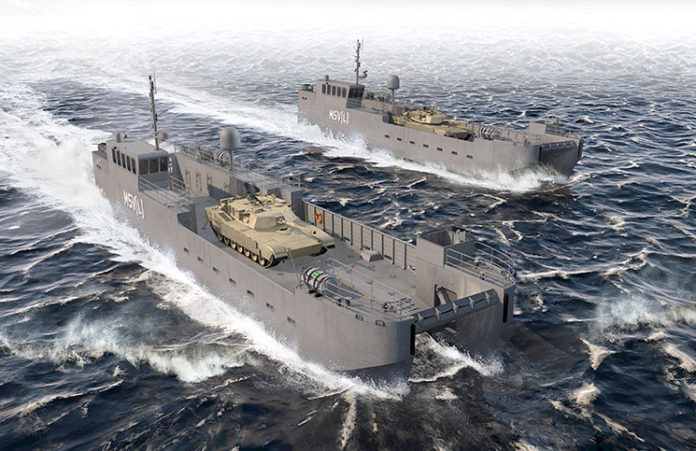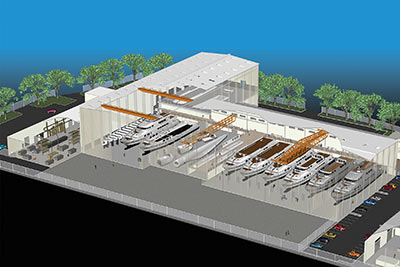
You can thank one of Vigor’s own Vancouver employees for bringing a massive expansion and $1 billion manufacturing contract to the city.
The company, a shipbuilder headquartered in Portland with operations in Oregon and Washington, announced in early February that it plans to purchase the former Christensen Yachts site in the Columbia Business Park. Vigor plans to use the new location to build a new generation of U.S. Army landing craft called the Maneuver Support Vessel (Light) or MSV(L), part of a $1 billion government contract. The site, which was brought to the company’s attention by a local employee, will be part of a restructuring which will bring about 200 jobs to Vancouver in the near term and another 200 by 2022 or 2023, said Jill Mackie, senior vice president of public affairs.
“We were looking for a site to build the MSV(L), and originally we thought we could do that in Seattle or in Portland at our Swan Island site,” Mackie said. “But we didn’t have enough room at either site to keep up with work on the new contract. We weren’t really looking in Vancouver, but somebody brought the building to our attention.”
It turns out that somebody was simply “a local Vigor employee who knew about the building” rather than an economic development group. Although after learning of the opportunity, the company reached out to the city of Vancouver and other economic development agencies, she said.
The company has 2,300 employees at its seven locations in Oregon, Washington and Alaska, including a few in the city of Vancouver. As part of the restructuring for the new space, about 70 workers from Vigor Kvichak in Ballard will be given the opportunity to relocate to Vancouver, and the Vigor Kvichak Ballard facility will close. Also, about 60 workers from the company’s Clackamas plant that are focused on aluminum ships will get an opportunity to relocate – which the company anticipates most will. The new Vancouver facility will focus on building aluminum ships, while other facilities will continue to focus on steel, Mackie said.
“It wasn’t originally our plan to bring all the aluminum work together, but once we saw the capability of the site, we saw we could do much more than the MSV(L),” Mackie said. “We knew we could bring a lot of remarkable projects into one space in Vancouver.”
Once the Vancouver site is purchased, which is anticipated by early summer, Vigor plans to move all of its aluminum work to the city, which should happen over the next year. The company anticipates spending about $7 million on equipment and building upgrades over the next few years.
The company plans to start off Vancouver operations with about 130 employees, growing to 250 employees by 2020 or so and another 150 to 200 coming on as production for the MSV(L) ramps up in 2022 or 2023.
Beyond the MSV(L), Vigor is also building aluminum Combatant Craft Medium (CCM) vehicles for the U.S. Navy and allies and the Response Boat-Medium (RB-M) for the U.S. Coast Guard and export market. The company also makes fast ferries, an interceptor and commercial workboats out of aluminum, all of which will be made in Vancouver.
“Vigor’s decision to keep and grow jobs in Washington State is a testament to the great quality of life and workforce we have available here,” Washington Gov. Jay Inslee said in a news release. “Our team worked intently with Vigor to find a competitive solution to keep these jobs in Washington and I’m glad to see the continued success of one of our great corporate citizens contributing to our economy by creating living wage jobs in Vancouver.”
Vigor’s MSV(L) work is in the very early stages. The company must first make a prototype, which the Army will test before requesting changes or improvements. After that, the company will make four units as part of the low rate production process, with those units also tested by the Army. Once those processes are complete, likely by 2022, then full rate production on the remaining 32 units will begin, Mackie said.

“In Vancouver we’ll go through a process of ramping up,” Mackie said. “In October of 2019, we’re expecting about 130 employees placed in Vancouver. By 2023, we expect to have about 400.”
Frank Foti, Vigor’s president and CEO, said the restructuring will strengthen the company as a whole and make it more competitive in the future.
“The synergies we will achieve by bringing these amazing builders together in one location strengthens our competitive advantage and builds upon our long-term goals as an outstanding industrial company,” Foti said in a news release. “While we’ve had operations in Vancouver since 1980, this move represents a substantial increase in the number of Vigor employees who will be living and working here. Our Vigor team looks forward to getting to know the Vancouver community better and being a force for good through our remarkable people and the economic activity associated with our work.”
The company plans to work with local educational organizations like Clark College to build worker pipelines for the new plant. It already works with Portland Community College for its Oregon production facilities, but the company also wants to talk about training in Vancouver, Mackie said.
“We have existing strong partnerships with community colleges in Portland, Seattle, Ketchikan and we’ll be leaning on the great work going on with the Swan Island Training Center (at our Swan Island Shipyard – partnership is with Portland Community College) as well as with our partners at Oregon Manufacturing Innovation Center (OMIC) to help with the training,” Mackie said. “We’ll be talking in the coming months with Clark College to discuss our needs and their programs. We will be talking with our labor partners and trades training programs as well.”
The jobs the company is hoping to fill are generally high wage and skilled. Production workers make about $60,000 a year, program and production managers make about $80,000 a year. Vigor will be looking for aluminum fabricators, fitters and welders, outfitters, electricians, painters, engineers and production managers, among other things.
“The beauty of this whole thing is we are able to bring together all of our aluminum expertise in one place,” Mackie said. “We’re very excited about that. It will make Vigor better and more competitive.”









